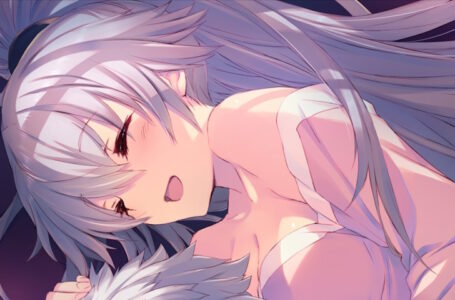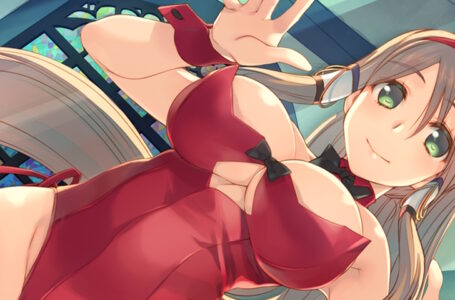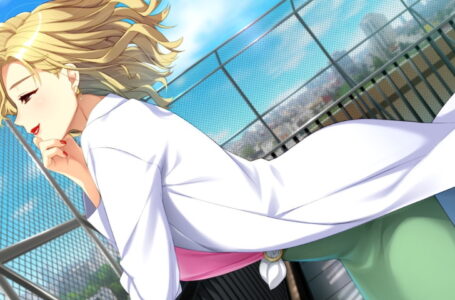How Doukyuusei appeals to both ’90s dating sim and Persona fans
It is a cliché these days to say that a game will appeal to Persona fans — or, worse, is “like Persona” — based on its inclusion of dating sim-esque elements. But the fact remains: there’s a significant crossover in appeal between Persona titles and classic ’90s style dating sims such as Doukyuusei: Bangin’ Summer, recently released to English speakers by Shiravune.
The Persona series (particularly 3 onwards) is heavily inspired by dating sims, much as it has drawn influences from dungeon-crawling and monster-collecting RPGs, and as such it stands to reason that fans of these games will probably dig traditional dating sims like Doukyuusei, particularly now we have a modernised and localised version of the latter.
At the same time, it’s worth remembering that the original Doukyuusei is one of the original dating sims out there — and as such there are many ways in which it reflects a different time in gaming. As we’ve previously talked about in The History of Lewd, there’s a distinct “feel” to ’90s eroge that is markedly different from titles developed today — and although the newer “Bangin’ Summer” version of Doukyuusei has been brought up to date in some ways, in others it remains notably, pleasingly authentic to its roots, especially in its 18+ incarnation.
So I thought we’d take a little look at both aspects today.
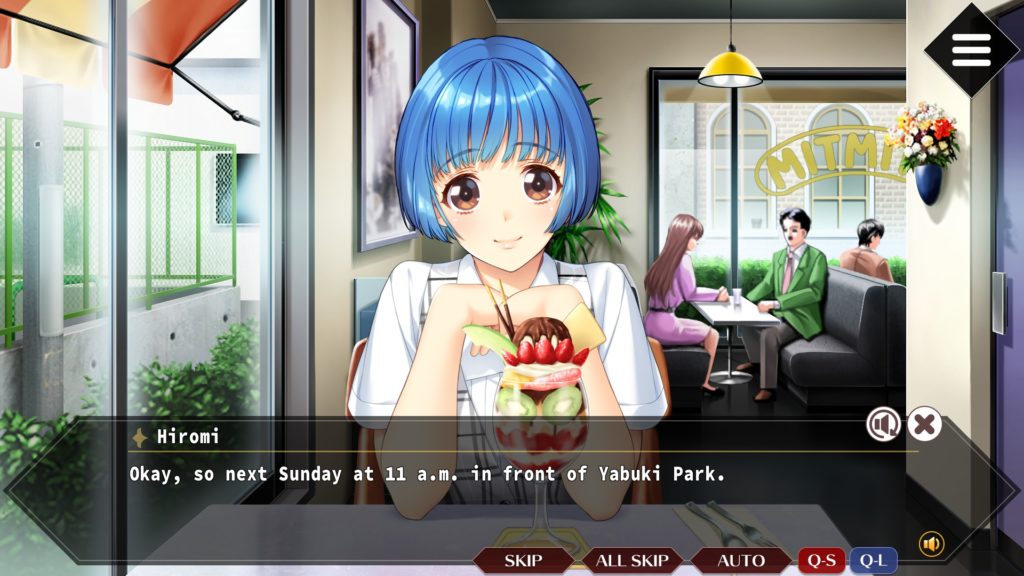
The Persona angle
I find it hard to believe that anyone reading this is yet to experience a Persona game for themselves, but on the offchance you are the exception, the basic gist of modern Persona games is that they have a strong emphasis on time management, and unfold as a series of distinct time slots as you progress through an in-game calendar.
Depending on the particular game you’re playing, you may find that either specific things happen on specific days (such as Persona 3’s “Full Moon” dungeons), or you have a particular deadline to achieve something (as seen in varying forms in Persona 4 and 5) — but between “now” and that event or deadline, you are relatively free to decide how to spend your time in the game’s take on modern-day Japan.
You can spend that time crawling the game’s dungeons, levelling up and collecting Personas, but more important for the purposes of our discussion today is the ability to socialise with other characters around the game world. By choosing specifically to spend a set amount of time with a particular friend, acquaintance, confidant or even lover, you’ll learn more about them and advance their own personal story. You’ll also unlock various mechanical benefits along the way, too, but for many players the real appeal is in simply getting to know the various characters.
Ideally what you want to do in a Persona game is advance through as many of these stories as you can in the available time — harder than it sounds! — because not only does this provide you with the maximum possible mechanical benefits, it also provides you with the maximum amount of story context. In getting to know as many characters as possible, you learn more about the world in which the game unfolds — and you might find yourself stumbling across some interesting and unexpected revelations along the way, too.
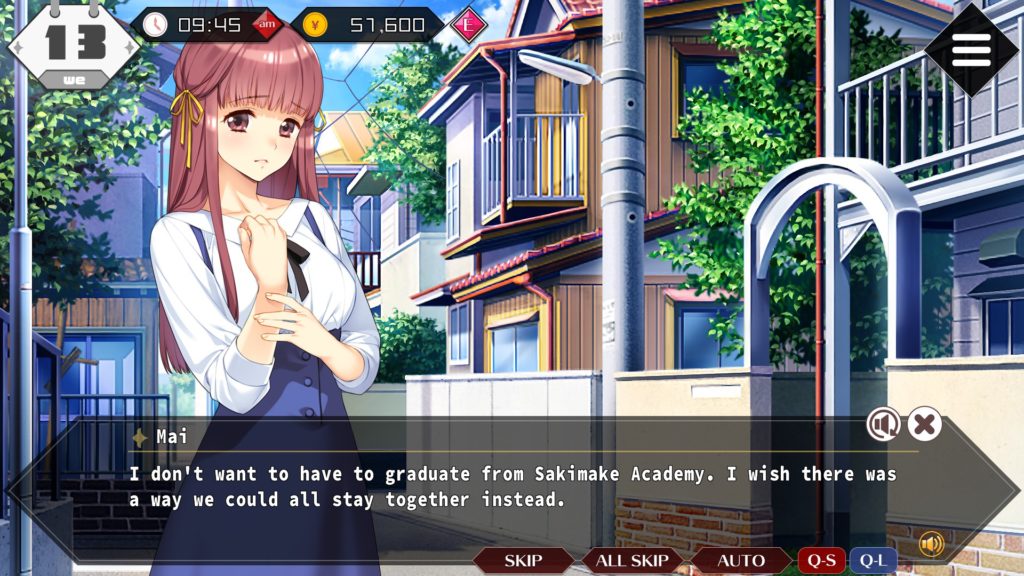
Doukyuusei is almost exactly the same — because, as previously noted, the Persona series from its third installment onwards was very much built on the basic structure of ’90s dating sims. Indeed, the only real difference between Doukyuusei and Persona is that in the former there’s no dungeon crawling and you can squeeze a bit more socialisation into a single day than you can in your typical Persona.
Other than that, though, the similarities should be fairly self-evident. In Doukyuusei, you move around the in-game town, stopping by various locations and interacting with characters. Sometimes that interaction is a simple friendly greeting that doesn’t advance that character’s “plot” as such, but acts as a good reminder that they’re going about their own business independently of you. Sometimes that interaction is a more deep and meaningful conversation where you have the opportunity to clarify your feelings on a subject. And sometimes a more major event occurs.
What’s particularly interesting about Doukyuusei is that there’s a certain amount of dependence between these narrative threads — in other words, you might not be able to advance one character’s storyline until you’ve gotten to know someone else a little better, or in other cases you might even lock yourself out of an opportunity to get closer with someone as a result of your actions and choices. Women talk!
Some of the Persona games have an element of this, also, often by requiring that you build up a particular “social stat” prior to commencing or advancing a character’s narrative. Sometimes there’s even the opportunity to make a character mad and “reverse” the arcana card that represents them until you calm them down. There are less in the way of outright dependencies between storylines, though — most Social Link or Confidant narratives are fairly self-contained — instead, Persona tends to gate off progress through these storylines (or the ability to start them, in some cases) according to your progress through the main narrative.
To sum all this up, the simple thing to say is that if your favourite bit of Persona games is hanging out with your buddies and talking about increasingly deep and meaningful things the longer you spend together, Doukyuusei is a game that will very much appeal to you.
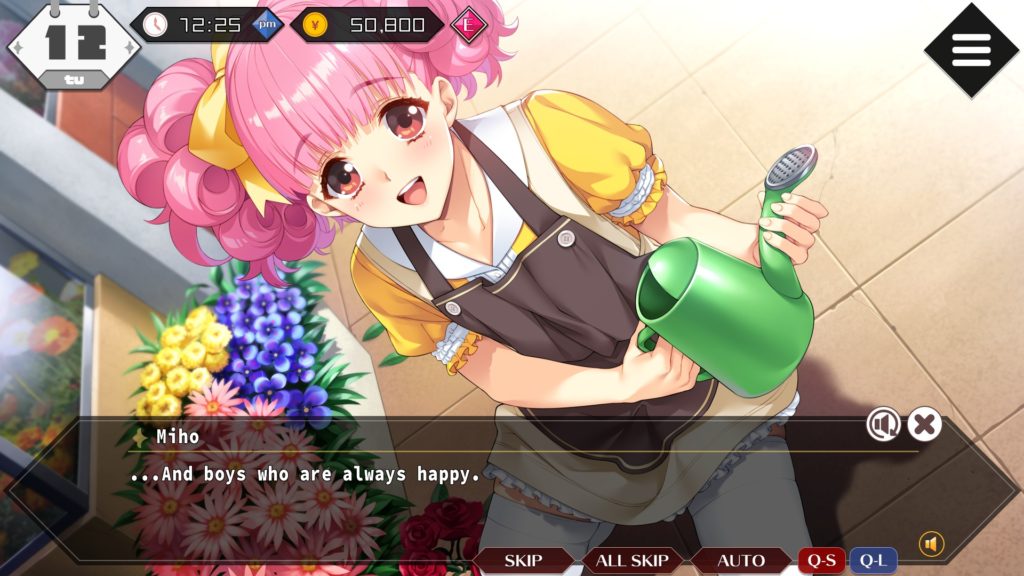
The ’90s dating sim angle
As previously noted, there’s a very distinct look and feel to ’90s dating sims, visual novels and Japanese adventure games, and in some respects this vibe is kind of hard to describe without it sounding a bit weird. It’s definitely a thing, though, and can be most clearly seen in titles that give you a certain amount of freedom of movement — games like Three Sisters’ Story, Nocturnal Illusion and Paradise Heights are probably the best examples, despite none of them technically being “dating sims” in the way Doukyuusei is.
What I’m talking about is probably best described as these games and their settings having a certain sinister feeling about them; the sense that although you’re spending the majority of your time interacting with pretty girls who have brightly coloured hair and eyes you can drown in, the world which you share with these lovely people is not a safe one, or indeed a nice one.
The key difference between the ’90s vibe I’m talking about and more modern visual novels that tackle challenging themes is that in the latter case, these elements tend to be pushed front and centre and make up major plot points, whereas in ’90s games you’re just as likely to stumble across something weird and/or unpleasant completely by chance, making it somehow all the more impactful.
For example, in the aforementioned Three Sisters’ Story, poking your head around the door of a classroom that doesn’t have any plot-relevant characters in it at the time sometimes reveals a couple going at it. In Nocturnal Illusion, you might stumble across the rather demure maid of the household being subjected to some pretty severe BDSM treatment that seems quite out of character for her. In Paradise Heights, the sighting of any male character that is not you usually feels like it should be cause for concern.
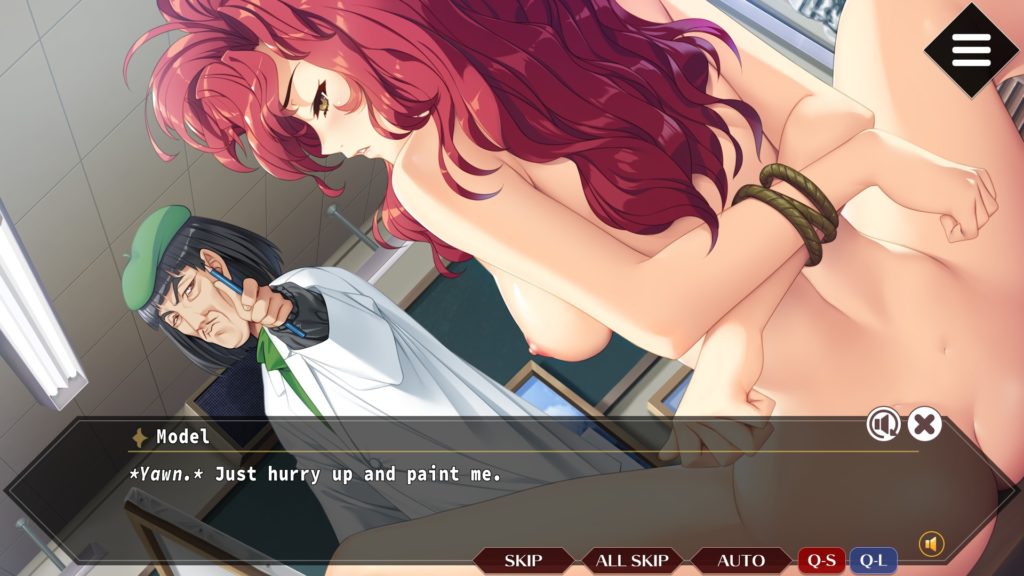
Doukyuusei follows this mould also. While the new “Easy” mode introduced in the newer version marks where major characters are on the map at all times, there are still unmarked locations that you can wander into and discover strange things going on.
Step into the art room and you’ll find a girl naked, tied up and rather bored at being painted by a lecherous old man who doesn’t think she’s wet enough. Poke your head around the door of the music room and you’ll find a topless, tearful violin student who appears to have whip marks all over her body being berated by her teacher for still not getting that particular passage right. And the longer you spend with the most prim-and-proper characters, the more likely you will find yourself on the floor admiring their undies with increasingly flimsy justifications.
All of this is pure ’90s — and a timely reminder that for as much as people whinge and moan about fanservice in modern anime and related media, in many cases things were taken to much greater extremes in days gone by! This is by no means a criticism of either ’90s media or the modern approach, either; Doukyuusei is just particularly interesting in that it’s a modern release with a distinctly ’90s feel to it — for reasons that should hopefully be obvious.
Some of you old-school pixel-art dating sim fans may well be wondering at this point how the new version of Doukyuusei shapes up in comparison to its original incarnation. Well, let’s take a look, shall we?
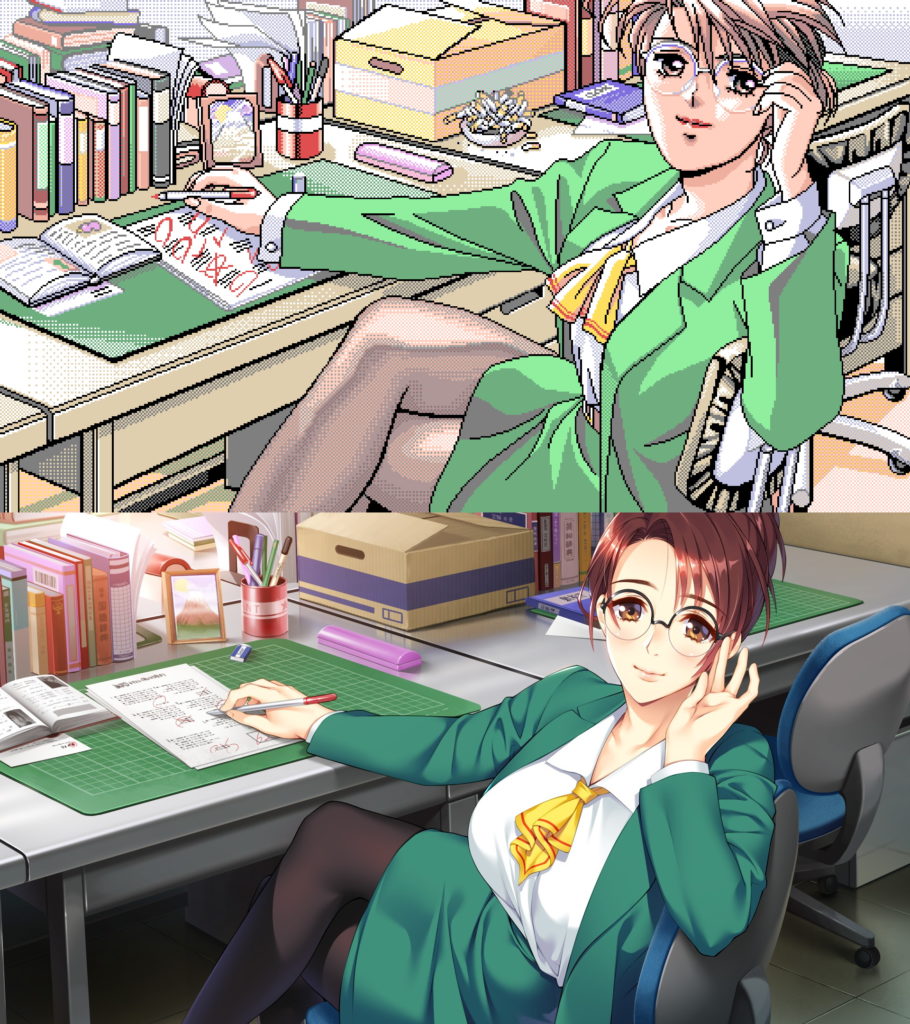
At the top, of course, we have the original 1992 version of Doukyuusei; at the bottom, the more recent version. This scene, showing your teacher Yoshiko, should demonstrate the new version’s clear commitment to authenticity while also polishing up a few elements according to modern character design preferences and design sensibilities.
The most obvious change is that Yoshiko’s hairstyle has been adjusted considerably from her very retro short, spiky cut in the original — rarely seen in today’s anime-inspired works, but very common in the ’90s — to a rather more feminine look in the remake. This softens her overall appearance significantly, and works well in the context of her character; her new look is more “stern headmistress” than “go-getting ’90s businesswoman”, and it makes sense.
You’ll also note how the ashtray full of cigarette butts is absent in the newer version; these don’t actually belong to Yoshiko so they’re not all that relevant, before anyone decides to get on their high horse about “censorship”. Their removal was most likely an attempt to reposition the new version of Doukyuusei as unfolding “now” rather than in 1992. While teachers smoking in the staffroom would have been a common sight in 1992, indoor smoking was banned in Japan in 2020.
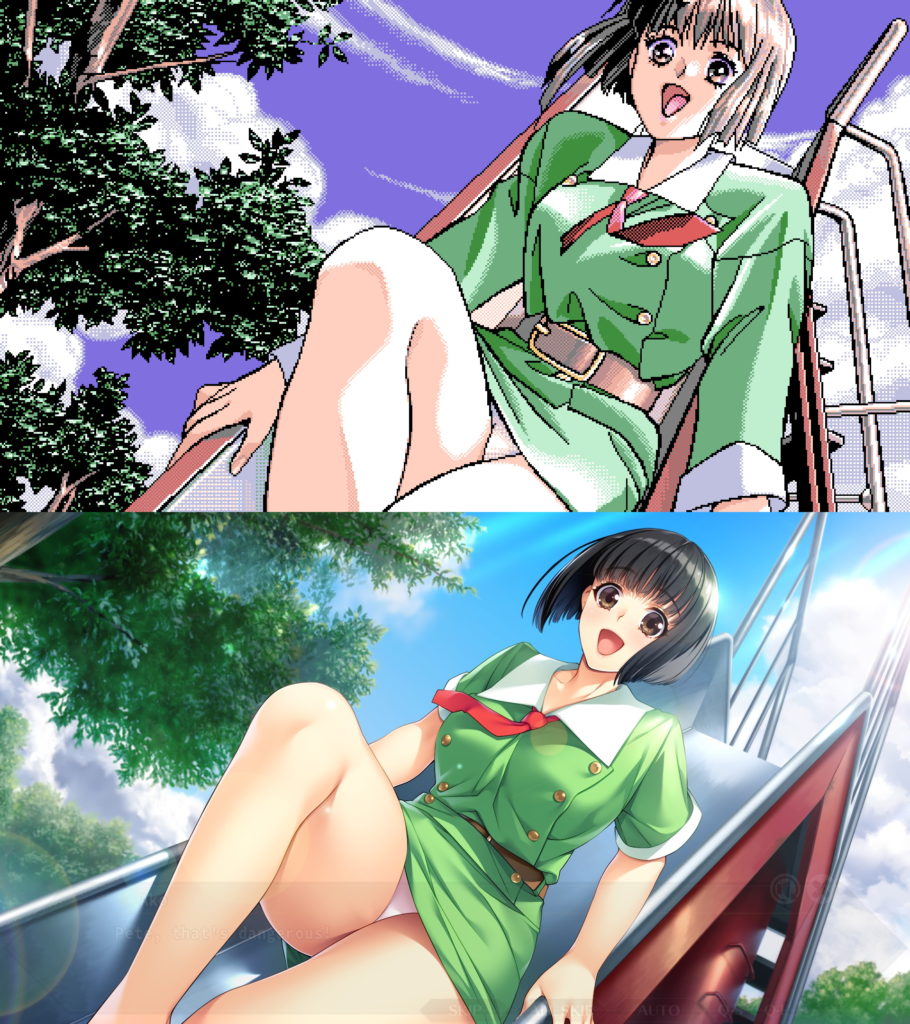
Here’s a good one showing an almost note-for-note remake of the scene where pharmacist Ako’s 89cm ass gets thoroughly wedged in a kids’ slide. There are a few minor changes — Ako’s shoulder pads are less severe and her sleeves are shorter in the new version (again, perhaps to make the new version of her outfit feel more “modern”), the slide looks a little wider and her tie is flowing in the other direction — but aside from that everything is present and correct here.
If anything, the newer version really plays up Ako’s spectacular bottom half. Look at those thighs.
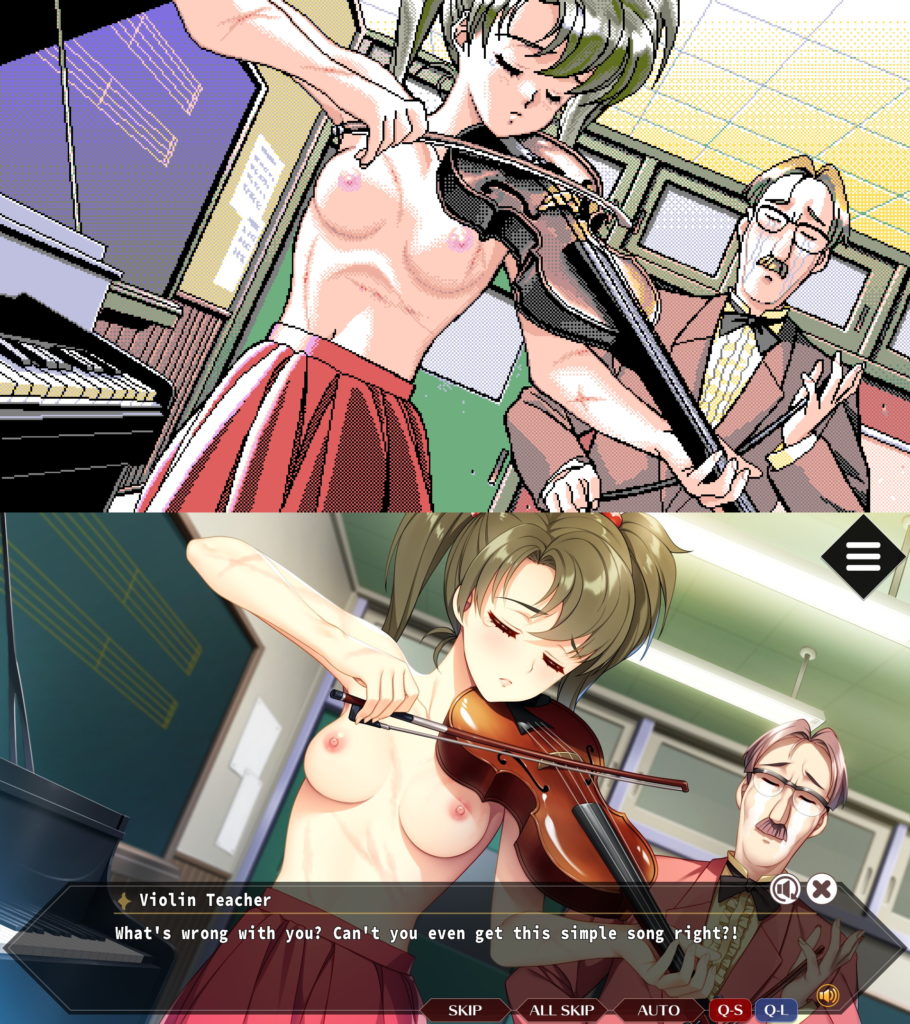
As our final example, here’s the aforementioned violin scene, which again is pretty much note-for-note recreated in the new version — albeit with marginally different framing that makes the riding crop in the teacher’s hand a little less obvious. That said, the whip marks are still very much visible in the new version, and the resolution arguably makes the pained expression on the girl’s face more obvious.
So there you have it. Doukyuusei’s new version is very much an authentic ’90s dating sim experience, but brought up to date to such a degree that young whippersnappers who cut their teeth on Persona instead of 16-colour 640×480 hentai will also be able to have a good time.
Sounds like a pretty ideal result for everyone, no?
Doukyuusei is available in all-ages form on Steam and in 18+ form from Johren. The Steam version can also be patched to add the 18+ content; said patch is free. Note that the 18+ version also features considerably racier dialogue in general compared to the all-ages version, as well as the added erotic scenes.
Join The Discussion
Rice Digital Discord
Rice Digital Twitter
Rice Digital Facebook
Or write us a letter for the Rice Digital Friday Letters Page by clicking here!
Disclosure: Some links in this article may be affiliate links, which means we may earn a small commission if you make a purchase after clicking on them. This is at no additional cost to you and helps support Rice Digital!
- Letter from the Editor: passing the torch - June 30, 2023
- Super Woden GP 2 is looking promising - June 30, 2023
- Inti Creates is making a 32 bit-style Love Live action platformer - June 26, 2023





